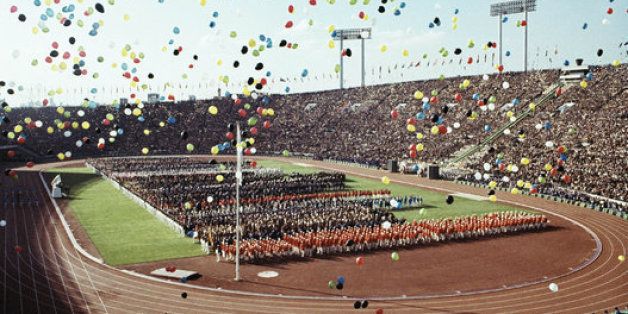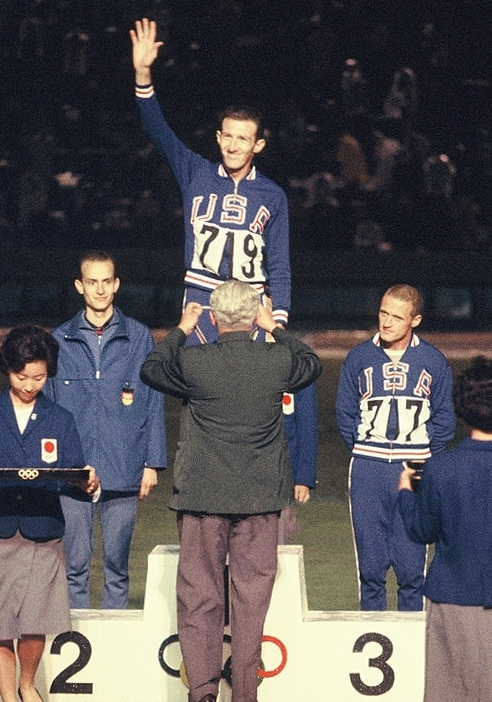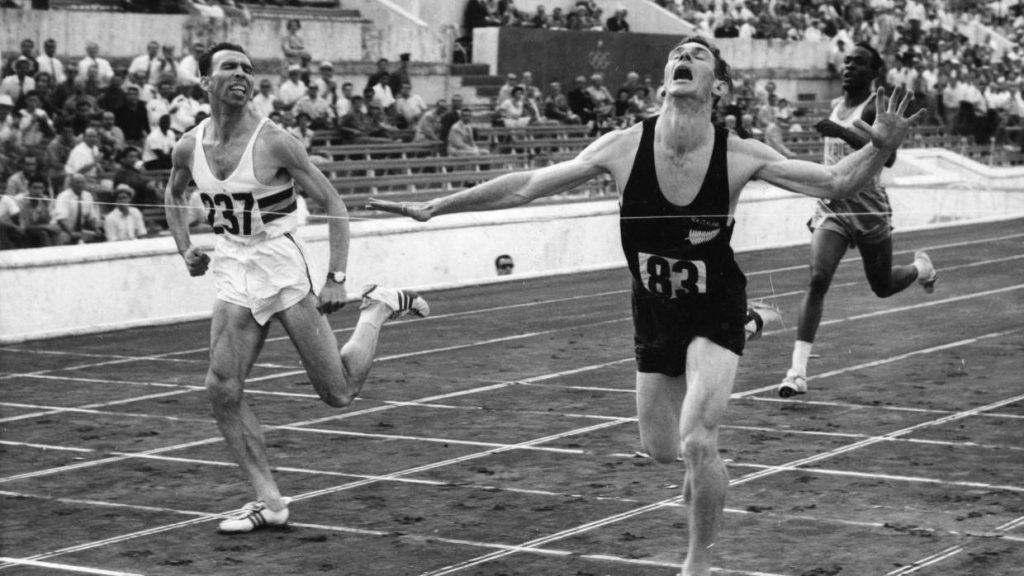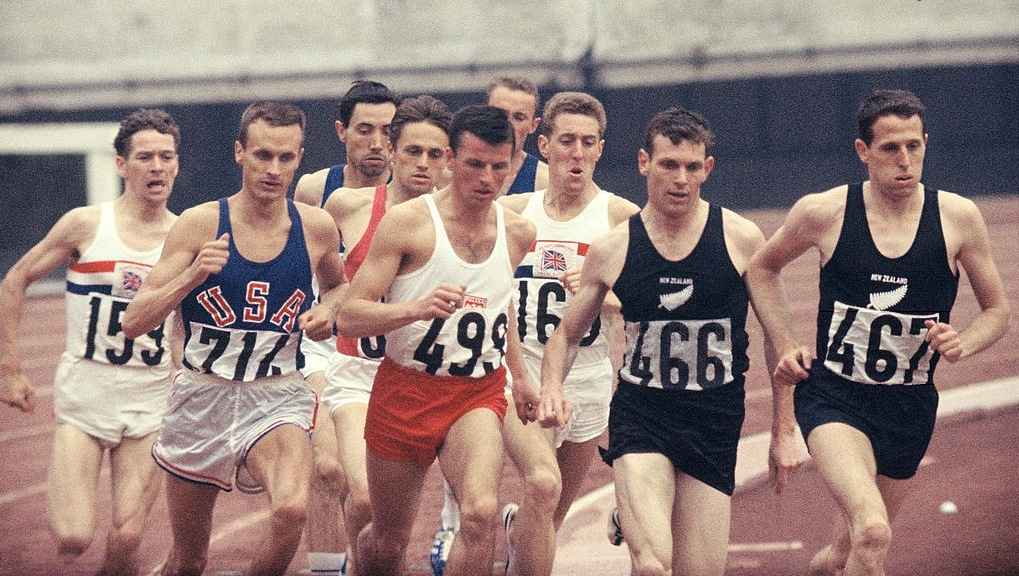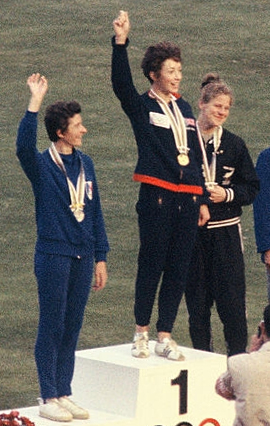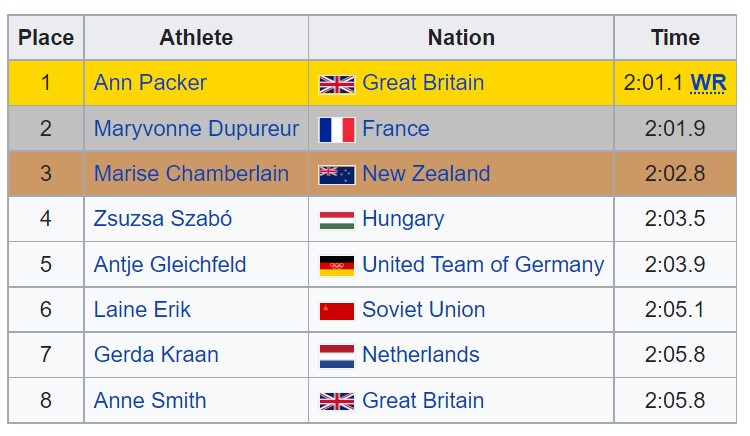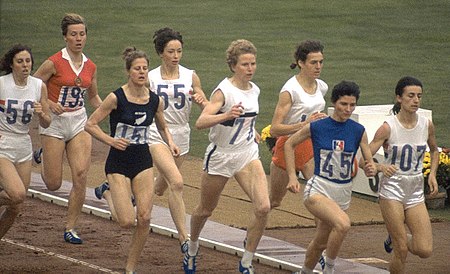This year’s Olympic Games (2020) in Tokyo are being compared to those held there in 1964, almost 60 years ago and being compared in terms such as how many Scots are in the team, how many medal chances do we have and so on but there was a lot happening there that was notable in its own right and is maybe worth a look. The complete official film of the Games (running time: 2 hours 05 minutes) is available on youtube at The Complete Tokyo 1964 Olympics Film | Olympic History – YouTube with extracts from some of the events also available.
- The first point to note is the obvious one – the Games are bigger now but the extent of the explosion is not often appreciated – there were 82 countries taking part in 1964 but there are 205 expected to turn up this time round. It was to be 206 but North Korea is now not certain to be there. Medals might just be a bit harder to come by.
- Second is the track that they will be racing on. In the photograph above of Billy Mills winning the 10000m, it is clear that they were running on cinders, note just how much the track has cut up. It was in fact the last time that a track of that sort was used – from 1968 tartan tracks have been used and tartan approaches have been used for field events. Males a difference in comparing the times over the years between.
- The number of athletics events is also different – there were two new events for women at the ’64 version – the 400m and the pentathlon. In the years since, the pentathlon has become a heptathlon and hammer, triple jump and steeplechase have been added in to the mix.
- It was also the first time that the Games had been held in Asia.
- And in the distance events, which we will be looking at, the Americans arrived.
If we compare the endurance events in 1960 and 1964 we get these two tables. from Wikipedia. 1960 first, then ’64.
| 800 metres |
Peter Snell |
1:46.3 (OR) |
Roger Moens |
1:46.5 | George Kerr |
1:47.1 |
| 1500 metres |
Herb Elliott |
3:35.6 (WR) |
Michel Jazy |
3:38.4 | István Rózsavölgyi |
3:39.2 |
| 5000 metres |
Murray Halberg |
13:43.4 | Hans Grodotzki |
13:44.6 | Kazimierz Zimny |
13:44.8 |
| 10,000 metres |
Pyotr Bolotnikov |
28:32.2 (OR) |
Hans Grodotzki |
28:37.0 | David Power |
28:38.2 |
Two from Australia, 2 from New Zealand, 2 from Germany, 1 each from Russia, Poland, Hungary, France, West Indies and Belgium. None from the USA and none from Africa. And none from Britain either! There is a different picture in 1964.
| 800 metres |
Peter Snell |
1:45.1 (OR) |
Bill Crothers |
1:45.6 | Wilson Kiprugut |
1:45.9 |
| 1500 metres |
Peter Snell |
3:38.1 | Josef Odložil |
3:39.6 | John Davies |
3:39.6 |
| 5000 metres |
Bob Schul |
13:48.8 | Harald Norpoth |
13:49.6 | Bill Dellinger |
13:49.8 |
| 10,000 metres |
Billy Mills |
28:24.4 (OR) |
Mohammed Gammoudi |
28:24.8 | Ron Clarke |
28:25.8 |
Three from the United States (including two winners), 3 from New Zealand (including to gold for Peter Snell), 2 from Africa, only 2 from Eastern Europe compared with 3 in ’60, 1 each from Australia and Canada. If we take the longest first
Tokyo’s 10000m had no fewer than 38 starters from 23 nations (on the cinder track) and there were 8 who did not run at all. Of the 38, 9 dropped out. In 1960 there were also 29 finishers. The victory of native American Billy Mills (photo above) was a big surprise, the tiny winning margin of less than half a second from Gammoudi was possibly the smallest of all time and Ron Clarke won a medal but not the gold he wanted and worked for. The wiki report on the race reads:
“World record holder Ron Clarke set the tone of the race. His tactic of surging every other lap appeared to be working. Halfway through the race, only five runners were still with Clarke: Mohammed Gammoudi of Tunisia, Mamo Wolde of Ethiopia, Barry Magee of New Zealand, Kokichi Tsuburaya of Japan, and Billy Mills of the United States. Magee and Tsuburaya, the local favorite, lost contact first, then Wolde. With two laps to go, only two runners were still with Clarke. On paper, it seemed to be Clarke’s race. He had run a world record time of 28:15.6 while neither Gammoudi nor Mills had ever run under 29 minutes.
Mills and Clarke were running together with Gammoudi right behind as they entered the final lap. They were lapping other runners and, down the backstretch, Clarke was boxed in. He pushed Mills once, then again. Then Gammoudi pushed his way between them both and surged into the lead as they rounded the final curve. Clarke recovered and began chasing Gammoudi while Mills appeared to be too far back to be in contention. Clarke failed to catch Gammoudi, but Mills pulled out to lane 4 and sprinted past them both. His winning time of 28:24.4 was almost 50 seconds faster than he had run before and set a new Olympic record for the event.
No American had ever before won the 10,000 m, nor has any other American come seriously close until Galen Rupp took the silver at the 2012 London Olympics.
The top four runners beat the standing Olympic record.”
Mills had had a difficult life up to that point and a full length feature biopic called ‘Running Brave’ was made – it was very good. One runner that I know spent a night in a hotel room watching it over and over on the movie channel in his room!
The 10,000m set things up for the Americans for the remainder of the Games. There was another American victory in the 5000m from Bob Schul. 54 athletes from 35 countries actually took part. There were four heats and a final with only Mike Wiggs of Britain’s trio making the final. The wiki report on this one reads:
” The world record holder Vladimir Kuts had retired five years earlier. Defending champion Murray Halberg didn’t make the final. Halberg and Pyotr Bolotnikov had dominated the event the previous four years but neither was in the final. The top runner of the year was Bob Schul from the Compton Invitational. This was Kip Keino‘s first Olympic final, but he would gain fame four years later.
In the slow, strategic race held in a light rain on a muddy dirt track Michel Jazy was more of a 1500 meter runner and expected to be ready for a fast finish. He kept himself in the lead or close to the lead throughout. Schul found himself on the curb boxed in by a loping Keino who seemed to be marking the field on the outside of the pack that also included future world record holder Ron Clarke. With 600 metres to go Bill Dellinger made the first move coming around the entire pack and into the lead. At age 30, old for an amateur athlete in this era, Dellinger came out of retirement to make one last attempt after failing to make the Olympic final the previous two Olympiads. Dellinger’s move was marked by Jazy as the pace quickened. Nikolay Dutov came around the entire pack to challenge Jazy and Dellinger. Shortly after the bell, Jazy decided to take off, jumping to the lead with Harald Norpoth coming from mid pack to become his closest pursuer 5 metres back as the field stretched out. A one speed runner, Clarke had no answer for the speedsters. With 300 to go, Schul came from fifth place to start picking off runners to get to Norpoth with 200 to go. Through the turn he passed Norpoth with Jazy constantly looking over his shoulder to check his pursuer. Jazy still had a two metres lead as they reached the final straight. But that lead disappeared rapidly as Schul sprinted by to take the gold medal. Jazy now watched Norpoth as he slowly edged by just before the finish. Given all he could, Jazy tried to maintain and glide across the finish line, but Dellinger, in full sprint, caught Jazy at the line to take the bronze medal. It took officials a half an hour to decide the bronze medalist.
Schul’s victory was the first and only American victory in the event. His was only the second medal in the history of the event; Dellinger’s bronze became the third.”
.If the 1950’s middle distance world belonged to Herb Elliott, the 1960’s were Peter Snell’s. 800m, half mile, 1500m, mile, 20 mile runs on a Sunday, he was definitely the man. In the ’64 Games, he won both 800m and 1500m by the same margin – 1.5 seconds in both. Just as the USA had three medals from 6 in the 5000/10000m double, so NZ won three of six in the 800/1500m double. The 800m came first with 47 athletes from 32 countries in action. There were three rounds – first round (6 heats), semi-finals (3) and finals. The United States with two runners had most in the final. The wiki report on the final read:
“The runners used a crouch start without blocks and a single turn stagger start (breaking after the first turn). Returning to the final from four years earlier were defending champion Peter Snell and bronze medalist George Kerr. While Snell started strongly, he found himself in third place at the break, led by aggressive front-running by Wilson Kiprugut. As others moved forward, Snell found himself boxed along the rail, so as the runners came onto the home stretch he had to slow to come out the back of the box, then as the bell approached, he glided along the outside to catch up to Kiprugut and Kerr in the lead. With free running room, Snell kept going, taking the lead on the penultimate turn. After establishing a three-metre lead, he held his position, even extending it a little to take the repeat gold. Down the backstretch, Bill Crothers made his way around Kiprugut while Kerr was trying to chase down Snell. Crothers came off the final turn with more speed, passing Kerr on the home stretch. Kerr began to struggle. Snell was too far ahead for Crothers to catch, but Kiprugut closed down on Kerr, passing him and sealing the bronze medal with a dip at the finish.
Snell became the third to defend his 800-metre title after Douglas Lowe and Mal Whitfield. The feat would not be accomplished again for 52 years until David Rudisha repeated in 2016. Kiprugut won Kenya’s first ever Olympic medal, unleashing a floodgate of national dominance in distance running events, particularly the 3000 meters steeplechase in subsequent Olympics.”
The wikipediea article on the race is most interesting and is worth a look – you will find it at https://en.wikipedia.org/wiki/Athletics_at_the_1964_Summer_Olympics_%E2%80%93_Men%27s_800_metres
Peeter Snell winning the 800m in the 1960 Olympic Games
Snell also won the 1500m in ’64 with team mate John Davies in third, taking the bronze medal. Like the 800m it had 3 rounds and there were 53 runners from 34 nations taking part. Snell, in total, had six races at the Games leading to his 2 gold medals – a ferocious week of racing. There were two British runners in the final Alan Simpson in fourth place and John Whetton in eighth of nine. The wikipedia report on the race is below.
“World and Olympic record holder, Herb Elliott was not back to defend his title, having retired from the sport at 24 years of age. 1960 800 metre champion Peter Snell entered the Olympics with the intent of duplicating his feat, doubling over similar distances at the previous 1962 Commonwealth Games. He had already lowered Elliott’s mile world record by a tick two years earlier. Snell had already successfully defended his 800 metre title.
As had been his typical strategy, Snell chose to stay in a marking position behind the leaders. Splits were recorded at 400 metres, 800 metres, and 1200 metres. Michel Bernard led after the first lap, Josef Odložil and John Davies were in front after two. Wary of being boxed in as he was in the 1960 Olympic 800, at the bell his countryman Davies held the lead while Snell was boxed in by Dyrol Burleson. He slowed then decisively moved to the outside to be in a position to run. Others were also scrambling for position, Witold Baran made his move and had the lead at the end of the third lap but Davies again assumed the lead down the backstretch. With about 220 metres to go, Snell accelerated, blowing past Baran and Davies, the others would now be racing for second place. Snell extended his lead to almost 10 metres, crossing the finish line 1.5 seconds ahead of anyone else. Through the turn, Alan Simpson got around Davies and Baran, behind them Burleson was moving to the outside. Even further back, Odložil began his final sprint around the outside of Burleson. Davies was able to get barely ahead of Simpson, holding him off at the finish line but that would only be for bronze as Odložil came roaring down the home stretch, catching both before the finish to grab silver.”
The Americans did not feature in the marathon as much as they did on the track. They had three runners – Buddy Edelen who had lived and trained in England for several years racing the best as often as he could, Billy Mills ran but after winning the 10000m he could not be expected to be at his best in what was not his best event, and Irishman Pete McArdle (who used to race against Cyril O’Boyle when they were both in Ireland) made up the trio. A total of 68 started and 58 finished. Result of the first 19.
| Rank | Athlete | Nation | Time | Notes |
|---|---|---|---|---|
| Abebe Bikila | 2:12:11.2 | WR | ||
| Basil Heatley | 2:16:19.2 | |||
| Kōkichi Tsuburaya | 2:16:22.8 | |||
| 4 | Brian Kilby | 2:17:02.4 | ||
| 5 | József Sütő | 2:17:55.8 | ||
| 6 | Leonard Edelen | 2:18:12.4 | ||
| 7 | Aurèle Vandendriessche | 2:18:42.6 | ||
| 8 | Kenji Kimihara | 2:19:49.0 | ||
| 9 | Ron Clarke | 2:20:26.8 | ||
| 10 | Demissie Wolde | 2:21:25.2 | ||
| 11 | Lee Sang-hun | 2:22:02.8 | ||
| 12 | Bakir Benaïssa | 2:22:27.0 | ||
| 13 | Eino Oksanen | 2:22:36.0 | ||
| 14 | Billy Mills | 2:22:55.4 | ||
| 15 | Toru Terasawa | 2:23:09.0 | ||
| 16 | Kim Yun-Bum | 2:24:40.6 | ||
| 17 | Giorgio Jegher | 2:24:45.2 | ||
| 18 | Václav Chudomel | 2:24:46.8 | ||
| 19 | Ron Hill | 2:25:34.4 |
It might sound strange to us but the 800m was the longest race in the Games at the time, and was still the case four years later. the women’s 1500m appeared in 1972, the 3000m and the marathon in 1984 and the 10,000m in 1988. There were v24 athletes from 16 countries competing and there were three rounds – Heats (3) Semi finals (2) and the Final.
After winning a silver medal in the 400 metres Ann Packer had no plans to run in the 800 metres and had a shopping trip planned until her fiancé, Robbie Brightwell finished fourth in the 400 metres. Disappointed for him, she turned to the 800 metres, an event which she had only raced in five times before. Packer, who had placed fifth in her first round heat and third in her semifinal, started the final as the second slowest of the eight contestants.
After the break in the final Zsuzsa Szabó took the lead with Maryvonne Dupureur and Antje Gleichfeld in close order behind her. Coming off the second turn Dupureur took the lead. At the bell she accelerated further. Packer was sixth at 400 metres, tagging along at the back of the pack behind Dupureur. Along the backstretch, Dupureur opened a gap which she extended through the final turn, five girls hit the 600 mark virtually shoulder to shoulder, with Packer a step behind the wall. Laine Erik was the outside of the wall but had more speed through the turn, the only one in the field looking to have enough speed to try to make progress on the now five metre lead of Dupureur.
Suddenly halfway through the final turn, Packer launched into a sprint, running around the other competitors. She took the lead in the final straight her sprinting speed taking her past Dupureur in a completely different gear to take the gold medal in world record time. The first five runners beat the Olympic record time (set by Dupureur in the semifinals).
Suddenly halfway through the final turn, Packer launched into a sprint, running around the other competitors. She took the lead in the final straight her sprinting speed taking her past Dupureur in a completely different gear to take the gold medal in world record time. The first five runners beat the Olympic record time (set by Dupureur in the semifinals).

